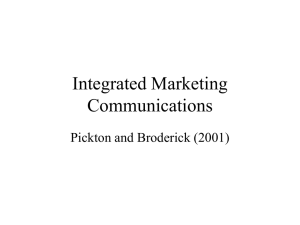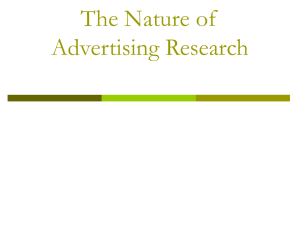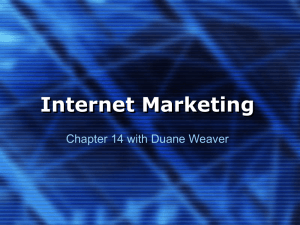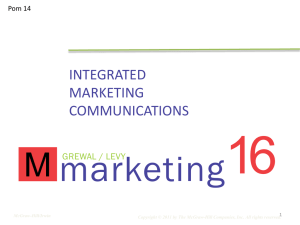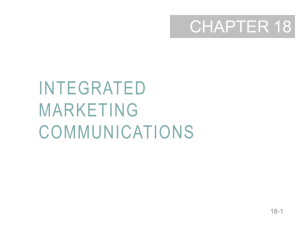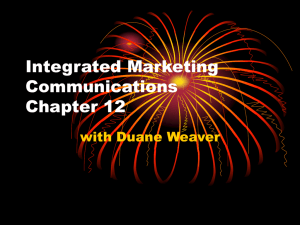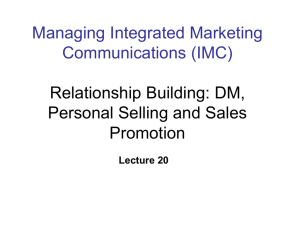IMC for Brand Equity
advertisement
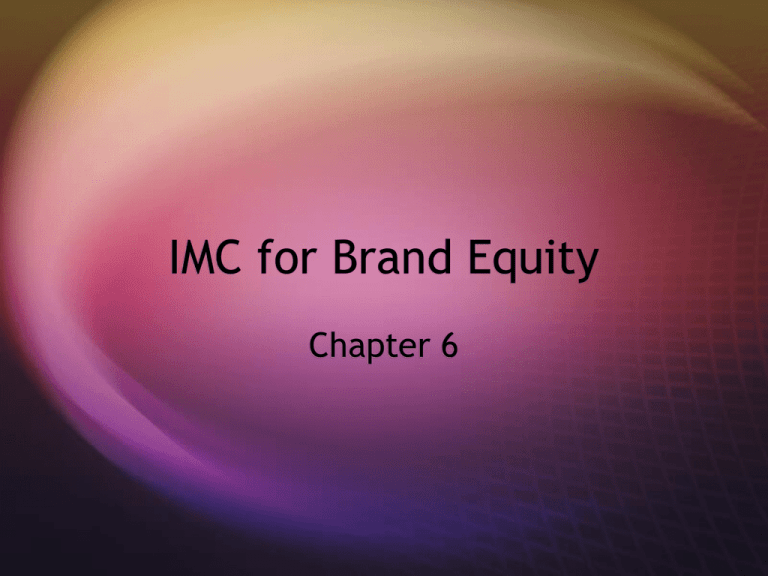
IMC for Brand Equity Chapter 6 Definition of IMC IMC is the process of developing and implementing various forms of persuasive communications programs with customers and prospects over time. IMC is designed to: Affect behavior Use all forms of contacts Start with the customer Achieve synergy Build relationships Information Processing Model Exposure - see or hear ad Attention - pause to notice ad Comprehension - get message Intention - will purchase Behavior - purchase Advertising Strategy Step 1 Define positioning - attributes & benefits • Points of parity- necessary/ competitive • Points of difference - desirable/ deliverable Advertising Strategy Step 2 Identify creative strategy to communicate positioning • Informational - benefit (prob-sol, demo, comparison, testimonial) • Transformational - imagery (usage, user, personality/values) • Motivational - borrowed (humor, sex) Customer Relationship Mangement Data base usage 1. tracking customer activity 2. Manage customer interactions Direct Response Mail - catalogues Telephone - 800 number ordering TV Infomercials - dramatic Web pages - informational Interactive ads - skyscrapers Non-traditional Ads Place advertising • billboards, posters • movies, airports, retailers Product placement Point of Purchase • supermarket radio • cart video Sales Promotion: Consumers User aggregate - continue to use; increase usage Potential aggregate - try product; put brand into category evoked set Sales Promotion: Trade Increase purchase frequency - deals Support brand advertising - co-op Increase inventories of brand products - shelf space and display options Event Marketing: Types Arts Festivals, fairs, annual events Cause marketing Entertainment, tours, attractions Event Marketing: Objectives Identify with consumer target market or lifestyle Increase brand awareness Create or reinforce perceptions of brand image associations Enhance corporate image dimensions Create experiences and evoke feelings Entertain clients, reward employees Permit merchandising opportunities Sponsorship To meet specific brand objectives Audience delivered must meet needs of brand consumers Events, naming opportunities Measurement - supply side - potential exposure from media coverage demand side - reported exposure from consumers PR and Publicity Company and brand image protection PR - annual reports, fund raising, membership drives, lobbying, event management, public affairs Publicity - press releases, media interviews, press conferences, feature articles, newsletters, photographs, films Buzz Marketing Word of mouth techniques for highinterest product categories (Krispy Kreme, Blair Witch Project) Cultural corruption? Personal Selling Sales reps become customer advocates Corporate sales attitude Recognition for performance through customer satisfaction not sales Data based contact to reinforce Frequent face-to-face interaction with consumer IMC Mix Criteria Coverage - reach and impressions Contribution - main effects of communications on consumers Commonality - consistent and cohesive brand image in every communication Complimentary - linkages of different communications Versatility - degree of appeal to all aggregates IMC Example: San Diego Zoological Society MAIN ATTRACTIONS Zoo - 800 species of animals in native habitat cages Wild Animal Park - 1800 acre preserve with 2500 animals living together in recreated African habitat SDZS Competetition Sea World LegoLand Disneyland Knott’s Berry Farm Universal Studios Magic Mountain SDZS Target Consumers 40% San Diego County 14% other parts of CA 35% from continental US 05% from outside US SDZS Communication Objectives Raise funding for society’s programs Provide public education Maintain image on local, regional, national & international levels Draw visitors to main attractions IMC Strategy: Advertising Objective: drive attendance; uphold image; educate and inform Audience: Members/ non-members; households in 5 CA counties; tertiary market of 7 states; tourist group sales Media: TV, radio, newspaper, magazine, direct marketing, outdoor, film locations IMC Strategy: Sales Promotion Objective: Drive attendance Audience: Southern CA co-op Media: Coupons, sweepstakes, tours, broadcast tradeouts, direct maiol, fliers, postcards IMC Strategy: Public Relations Objective: Inform, educate, maintain image, reinforce advertising message Audience: local to international Media: event coverage; features in local, national and global media; talk show appearances; web site IMC Strategy: IMC Strategy: Corporate Sponsorships & Events Objectives: Provide event funding, promote special programs with corporate sponsors; develop businesszoo partnerships Audience: Zoo supporters and corporate partners Media: Ad, PR, co-ops, ticket trades, hospitality centers IMC Strategy: Direct Mail Objective: Maintain large supporter base Audience: local, regional, national and global children, seniors, couples and single memberships Media: Direct mail and on-grounds visibility IMC Strategy: Group Sales Objective: Maintain group traffic and revenue with group tours Audience: Conventions, incentive groups, bus tours, associations, scouts, schools, military, organizations, etc. Media: Travel and tourism trade shows, telemarketing, direct mail, trade publications, advertising, web alliances Measurement Ticket sales Media coverage Web inquiries Positive attitude and awareness research New memberships and renewals Business alliances
